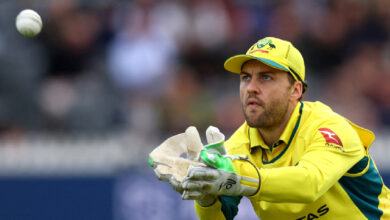Badminton’s new face France’s Alex Lanier reframes the sport with muscle power | Badminton News

The last two Olympics men’s singles titles have gone to a European, not an Asian. And the first Tour title immediately after Paris Games, the Japan Open, a Super 750 final (that’s just one rung below the Big4 like All England and China Open), was won French teenager Alex Lanier.
If Danish Viktor Axelsen’s tall, strapping mic-drop game has seen him collect titles at will, peaking for the big events and absolutely crushing opponents in one-sided finals, the 19-year-old Lanier brings a different physicality to the sport. Lanier, who is 1.8 metres long, got dubbed the ‘Beast’, as he brought a very high level of muscularity to the court, combined with quickness of movement and flexibility, that will prove to be a headache in coming years for Asians who have stuck to the lean, quick-footed, fast-reflexed bodytype when playing the sport.
Raw power – the likes that is employed Axelsen and now Alex Lanier – however, can stub out all nuance of skill, deception and reflex. Once pace and clever placement get countered intelligent anticipation, it is very easy for power to completely derail speed. Remember how Axelsen squished Lakshya Sen in the semifinals of the Paris Olympics in the second set? He didn’t even grant final Kunlavut Vitidsarn a 19-19 mirage in the opening set. That’s what towering power does.
The BWF in describing Lanier’s win over World No 1, Chinese Shi Yuqi at Japan, said, the Frenchman “imposed his tempo” on his opponent. Lanier himself talking to the press thereafter, explained he made Yuqi “lose his shot quality with sustained pressure” after the Chinese had looked in control of the opening set. Yuqi conceded Lanier was a ‘strong player’, which he meant the muscle on the strokes. The Frenchman’s scalps over that week in Yokohoma were Lee Zii Jia, Chico Wardoyo, Kenta Nishimoto, Shi Yuqi and Chou Tien Chen, pretty strongly built themselves in terms of the whip on the smash, but Lanier out-muscled them all.
Lanier’s win can either be dubbed a flash in the pan or just a fresh player making the most of an opportunity against those who were returning weary from the Olympics, and not totally quite there. But that would be a folly. The former junior World No 1, who didn’t make the French 2 at the Paris draw, has been picking some impressive wins even as attention was on Popov brothers. Lanier had lost to Indian Meiraba Maisnam a couple of seasons ago, but had beaten Priyanshu Rajawat in red-hot form at Canada Open just before Paris Olympics. His growth in the last one year has been quite dizzy, and a Super 750 crown is the reward. Perhaps the biggest compliment came from Axelsen, who within hours of the title was congratulating Lanier – also an acknowledgment of a rival spotted.
The French surge in badminton – driven entirely Paris hosting the Games – might be starting to chomp into Asians, but their prime opponents remain the powerful Danes, and this is a start of a much-needed European rivalry. Speaking to Olympics.com last year, Lanier had said, “When one French player became stronger, then the others followed and it was natural. They showed me that we can, from France, win the European titles and we can beat the Danish guys. We can beat everyone in the world; that’s not impossible.”
Lanier hails from Normandy, and literally started badminton when the racquet was taller than him – at age 2, accompanying both his parents to the indoor barn-courts, where the mofussil French spend their winters. He’s grown up idolising Lin Dan’s mixture of power and ‘laziness’ (“We think that he’s not really moving around the court, but he had a beautiful deception and he didn’t really need to move, in fact,” he told Olympics.com). But he brings dinct European physicality which can disrupt the Asian order of dominance of this sport.
Lanier is just 19 and was determined after not qualifying for Paris, and his opponents at Japan weren’t exactly in the best shape – mentally or physically, post Olympics. Soon after winning Japan though, he announced his intent to make a mark at the Paris World Championships in 2025.
The likes of Lakshya Sen, Li Shifeng and Kunlavut will continue to max their strengths of lithe speed, tall physicality and endless endurance and compact technique respectively. But as Viktor Axelsen has shown power combined with solid technical prowess can help you dominate badminton and end the Asian hegemony. Hosting the Olympics definitely fast-tracked French badminton. There’s another projection on muscled, power-badminton that’s a little more scary given where the Games are headed in four years time. Like Indian national coach Pullela Gopichand says, “Now imagine when the Americans get into the mix!”







